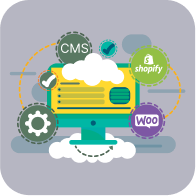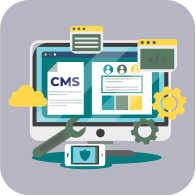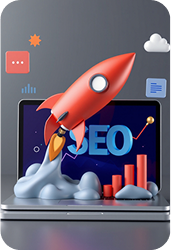Choosing the Right CMS
In today’s fast-paced business environment, leveraging digital tools is essential to stay competitive. Whether you’re a small startup or an established enterprise, the right tools can dramatically improve efficiency, collaboration, and productivity across your organization.

What Is a Content Management System (CMS)?
A CMS is software that enables users to create, manage, and publish digital content on websites without requiring deep coding expertise. The CMS serves as the structure for website content, allowing for streamlined editing, publishing, and updating. Key features of most CMS platforms include user-friendly interfaces, customizable templates, content version control, and various integrations.
Popular CMS Options: A Comparative Overview
WORDPRESS
Overview: WordPress is an open-source CMS with a massive global user base and a large repository of plugins and themes. Initially developed for blogging, it now powers a wide variety of websites, from personal blogs to e-commerce stores.

PROs
- Ease of Use: Intuitive and suitable for beginners.
- Extensive Plugin Library: Thousands of plugins for customization.
- SEO-Friendly: Strong SEO capabilities with plugins like Yoast SEO.
- Active Community Support: Vast online resources and tutorials.

Cons
- Maintenance: Frequent updates to plugins, themes, and the core platform.
- Security Vulnerabilities: Due to its popularity, it’s a common target for hackers, requiring robust security practices.
joomla
Overview: Joomla is a flexible and powerful open-source CMS, known for its complexity but also its flexibility. It’s ideal for websites that need multiple customization options without the use of extensive plugins.

PROs
- User Management: Superior for websites that require multiple user roles.
- Multilingual Capabilities: Built-in language support.
- Advanced Customization: Ideal for those comfortable with web development.

Cons
- Steep Learning Curve: More complex than WordPress.
- Limited Extensions: Compared to WordPress, fewer plugins and themes are available.
Shopify
Overview: Shopify is a popular e-commerce-focused CMS designed for online stores of all sizes. As a hosted solution, it handles hosting, maintenance, and security.

PROs
- E-commerce-Focused Features: Powerful tools for managing products, inventory, and payments.
- Built-In Security: Shopify handles security, making it ideal for high-traffic online stores.
- App Integration: Extensive app store to expand store functionality.

Cons
- Monthly Subscription Fees: Paid plans may be expensive for smaller businesses.
- Less Flexibility in Customization: Limited control over certain design aspects and code.
Drupal
Overview: Drupal is an open-source CMS designed for more complex websites requiring a high degree of customization. It’s known for its flexibility, scalability, and high-security features.

PROs
- High-Level Security: Popular among government and large enterprise websites.
- Scalability: Handles large amounts of content and traffic efficiently.
- Custom Content Types and Taxonomies: Ideal for websites that require custom functionality.

Cons
- Developer-Heavy: Requires extensive knowledge to set up and manage.
- Learning Curve: Not beginner-friendly and requires more time to master.
WIx
Overview: Wix is a user-friendly, cloud-based CMS known for its drag-and-drop editor. It’s popular among small businesses and users looking for a simple website setup without coding.

PROs
- Easy Drag-and-Drop Interface: No coding skills required.
- Low Maintenance: Wix handles updates, hosting, and security.
- Quick Setup: Suitable for small business sites and personal blogs.

Cons
- Developer-Heavy: Requires extensive knowledge to set up and manage.
- Learning Curve: Not beginner-friendly and requires more time to master.
Key Factors to Consider When Choosing a CMS

Business Goals and Objectives
Your business goals should be at the forefront when choosing a CMS. For example:
- Content-Driven Sites (blogs, news sites): WordPress or Joomla may be more suitable due to their robust content management tools.
- E-commerce Sites: Shopify or WooCommerce on WordPress are tailored for e-commerce, providing integrated payment gateways, inventory tracking, and customer management features.

Ease of Use and Learning Curve
Consider who will be managing the website’s content. If your team lacks technical expertise, a CMS with an easy-to-use interface, such as WordPress or Wix, may be the best choice. Platforms like Joomla and Drupal may be more challenging for beginners but offer flexibility for complex site needs.

Customization and Flexibility
If your site requires unique features or heavy customization, look for a CMS with strong development capabilities. Drupal and Joomla provide more in-depth customization options, while WordPress offers extensive plugin support for various custom functions. Shopify and Wix are less flexible but come with built-in tools for specific uses like e-commerce and portfolio websites.

Scalability for Future Growth
Choose a CMS that can grow with your business. If you plan to expand your site with additional features, content, or users, opt for a platform with scalability options. WordPress and Drupal excel in this area, as they can handle increased traffic and complex site structures.

Cost and Budget
CMS costs vary widely, from free open-source platforms to subscription-based services. Factor in the total cost of ownership, including:
- Licensing Fees: Some CMS platforms require monthly or annual subscriptions.
- Customization Costs: Consider costs for plugins, themes, and custom development.
- Maintenance and Security: Open-source platforms may require paid security plugins and hosting, while hosted solutions like Shopify and Wix include these in their fees.

Security Requirements
For businesses handling sensitive customer information, security is paramount. Drupal and Shopify are known for their strong security features, while WordPress can be secured effectively with proper plugins and regular updates.
CMS Recommended by Business Type

Small Businesses and Startups Recommended CMS:
WordPress, Wix, Shopify Reason: These platforms are user-friendly, affordable, and offer a wide variety of themes and plugins to customize your site without extensive technical knowledge.

Large Enterprises and Government Sites Recommended CMS:
Drupal, Reason: Drupal’s scalability, security, and flexibility make it ideal for handling large volumes of content, traffic, and complex user roles.

E-commerce Businesses Recommended CMS:
Shopify WooCommerce (on WordPress) Reason: Both platforms provide robust e-commerce functionalities, with Shopify offering a managed experience and WooCommerce allowing for more customization on a WordPress foundation.

Content-Heavy Websites (Blogs, News Sites) Recommended CMS:
WordPress Joomla Reason: WordPress excels in content management and SEO, while Joomla provides flexibility for custom features without heavy reliance on plugins.
Tips for Successful CMS Implementaion

Plan Your Content Strategy
Define your content needs and structure before choosing a CMS. Outline the types of content you’ll publish, frequency, and categorization. This will help you select a CMS that can efficiently manage your content flow.

Assess Your Technical Resources
Consider the skill level of the team that will be managing the website. If you don’t have in-house technical expertise, a simpler CMS or one with extensive community support may be the best choice.

Conduct a Test Run
Most CMS platforms offer free trials or demos. Test different CMS options to gauge their user-friendliness, customization potential, and support for integrations before committing to one.

Optimize for SEO from the Start
SEO is essential for visibility and reach. Choose a CMS that supports SEO features, such as customizable URLs, meta descriptions, and image alt tags, or integrate an SEO plugin to help optimize your site from the beginning.

Prioritize Mobile-Friendliness
With the rise of mobile browsing, a responsive design is essential. Ensure your CMS supports mobile optimization and choose themes or templates that are responsive across devices.

Selecting the right CMS for your business requires a balance between current needs and future scalability. WordPress is versatile and user-friendly, making it suitable for a broad range of businesses, while platforms like Shopify and Drupal cater to more specific use cases in e-commerce and complex content management.
By considering factors such as ease of use, customization, security, and scalability, you can choose a CMS that aligns with your business goals, enhances your online presence, and supports your growth trajectory.
Taking the time to choose a CMS that fits your unique requirements will ensure a smoother experience and a more robust foundation for your digital success.
